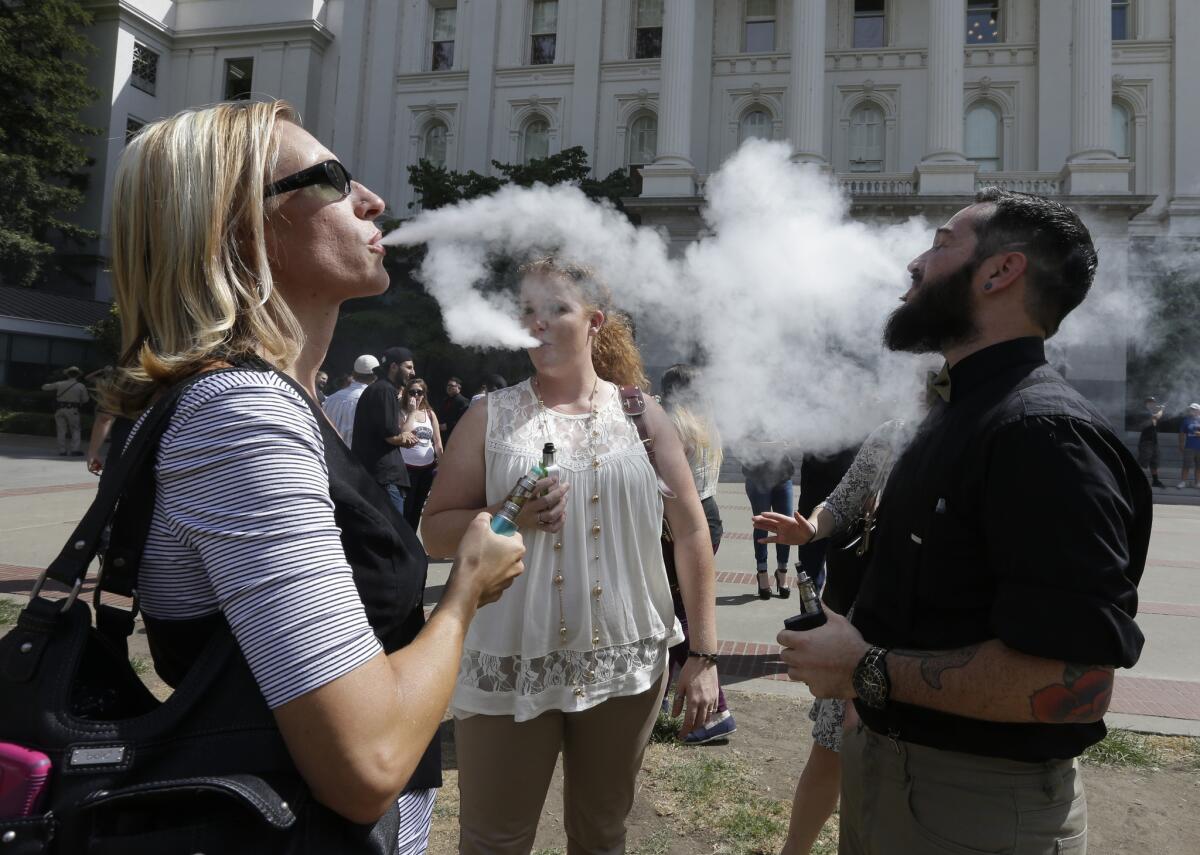Friends’ approval of e-cigarettes may turn teens toward vaping, USC study suggests

E-cigarette use is on the rise among adolescents and young adults. A new study in the journal Pediatrics sought to examine the social factors associated with increases in vaping among high school students in Southern California.
- Share via
It’s no secret that vaping is on the rise among California teens.
Now, a team of USC researchers has delved deeper into the trend to try to understand how much high school students’ social environment has to do with the uptick in electronic cigarette use -- and what it all might mean for the future of traditional cigarette use, which has been in steady decline, as well.
The concern? That widespread “favorable social perceptions” about vaping among members of a new generation might “contribute to the renormalization of tobacco products generally,” wrote Keck School of Medicine postdoctoral researcher Jessica L. Barrington-Trimis and colleagues in a study published online Monday in the journal Pediatrics.
To explore the question, the team used survey data collected from 2,084 11th- and 12th-grade students between January and June 2014. The teens were participants in the Southern California Children’s Health Study, a long-running effort initially developed to study the health consequences of air pollution.
The USC researchers asked the students how many of them used e-cigarettes and traditional cigarettes, how many of their friends used e-cigarettes and traditional cigarettes and how recent and frequent that use had been. They also asked the kids questions designed to evaluate “psychosocial factors” involved in vaping and smoking -- such as whether their peers approved or disapproved of it, whether household members vaped or smoked, and whether the students believed vaping and smoking were bad for their health.
In all, 24% of the teens reported ever having used e-cigarettes, with 9.6% saying they were current users -- that is, that they had vaped in the last 30 days. Boys were twice as likely as girls to be current users. Smoking cigarettes was less popular, with only 18.7% of the kids reporting they had ever smoked; 5.7% currently. Sixty-six students had smoked both e-cigarettes and traditional cigarettes in the last 30 days, which was 3.2% of the total sample and 33% of the current e-cigarette users.
The researchers found that students who used e-cigarettes were likely to report that their friends approved of vaping, and that others used the products in their homes. According to the study, 34% of teens who were using e-cigarettes currently shared a home with another e-cigarette user, while only 7.3% of teens who had never used e-cigarettes did. Similarly, 49.5% of study subjects who had used e-cigarettes in the last 30 days had three or four friends who also used them, while only 3.4% of subjects who had never used e-cigarettes did.
Most of the students believed that cigarettes and e-cigarettes were bad for health, but nearly half of teens who had used e-cigarettes in the past 30 days disagreed that e-cigarettes were dangerous (teen smokers, on the other hand, tended to agree that tobacco was bad for their health.) Hispanic kids were less likely to be influenced by the social risk factors than white kids, the researchers found.
“Overall,” they wrote, “students’ responses indicated a social environment more favorable to the use of e-cigarettes than to smoking cigarettes.”
But, they noted, both smoking and vaping “shared common social risk factors, and a favorable e-cigarette social environment was strongly associated both with e-cigarette use and with smoking... Research is needed to determine whether the use of e-cigarettes by nonsmoking adolescents could function as a gateway to combustible cigarette use.”
The team also called for more research into the health effects of e-cigarettes themselves.
For more on science and health, follow me on Twitter: @LATerynbrown







